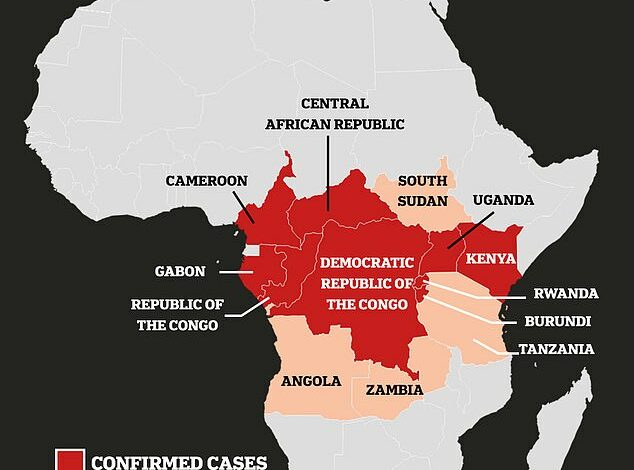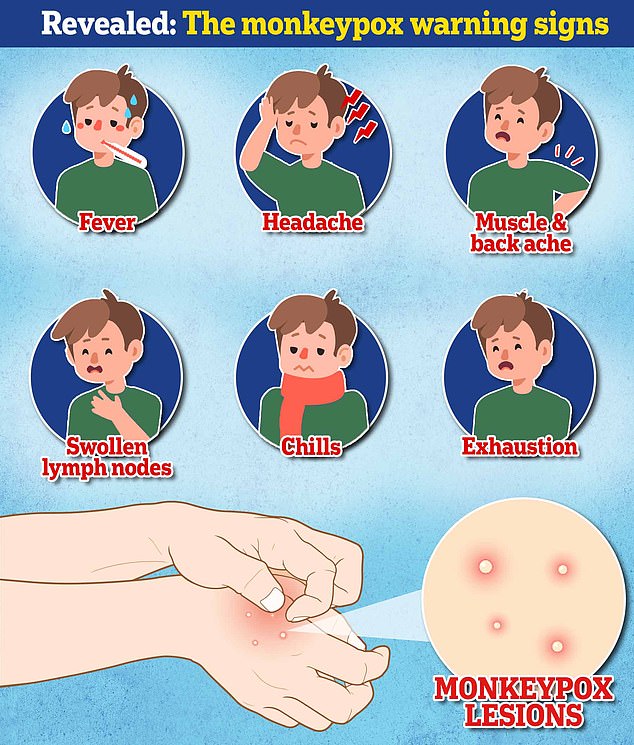Mpox is NOT the new Covid, WHO announces urgent update on spread of deadly virus






Europe is recording 100 new cases of mpox every month, a World Health Organization (WHO) director warned today.
Dr Hans Kluge, the UN agency’s regional director for Europe, said a “lack of commitment” and “resources” from European governments had failed to eradicate the virus, which causes a skin rash.
But at a briefing at the UN Palace in Geneva, he warned that mpox is “not the ‘new Covid’.”
This is because another, mutated form of the virus is currently spreading rapidly in Africa, killing an estimated 10 percent of those infected.
It is a descendant of the deadly clade I strain of mpox, formerly known as monkeypox, and is distinct from the mild variant that spread to more than a dozen countries, including the United Kingdom, in 2022.

This map shows the areas where cases of the new mpox strain have been confirmed (shaded in red) and the countries where UK health officials say there is a risk of cases emerging.


It is a far cry from the 2022 outbreak, when thousands of cases were recorded, mostly in London.
Dr Kluge told the UN Palace briefing in Geneva: ‘Mpox is not the “new COVID”.
‘Regardless of whether it is mpox clade I, behind the ongoing outbreak in East-Central Africa – or mpox clade II, behind the 2022 outbreak that initially affected Europe – and has been circulating in Europe since then.
‘We already know a lot about clade II. We still have to learn more about clade I.
‘Based on what we do know, mpox is primarily transmitted through skin-to-skin contact with mpox lesions, including during sex.’
He added: ‘Today we see about 100 new cases of mpox clade II every month in the European region.
‘However, the current state of readiness for clade I offers Europe the opportunity to refocus on clade II.
‘Two years ago, we got mpox under control in Europe thanks to the direct involvement of the most affected communities of men who have sex with men.
‘We have implemented strict surveillance, we have thoroughly investigated new contacts with infections and we have provided sound public health advice.
‘Behavioural change, non-discriminatory public health measures and mpox vaccination have contributed to controlling the outbreak.
‘We have learned from our success and have called on governments and health authorities to continue these measures to help eliminate mpox from Europe.
‘But due to a lack of commitment and resources, we have not been able to take the final step.
‘In short, even as we increase vigilance against mpox clade I, we can – and should – aim to eradicate clade II from Europe once and for all.’
The latest data from WHO shows that more than 99,000 cases of mpox have been recorded worldwide since January 2022.
Clade II In 2022, health officials became concerned as the virus spread rapidly across several countries, mainly through sexual contact between gay and bisexual men.
However, the number of new infections gradually declined, thanks to increased awareness of the disease and an accelerated vaccination program.

The smallpox vaccine is known to help prevent mpox because the two viruses are closely related. But experts said there was not yet enough evidence to suggest a vaccine would be effective against the new clade 1b strain

This map shows the location of mpox cases by country in the UK between January 2023 and the end of July this year
At the time, the UK reported almost 4,000 cases of the less severe form of mpox, with NHS England vaccinating more than 68,000 people against the disease with the smallpox vaccine, which works because the two viruses are closely related.
The mutated form currently worrying health experts, called clade Ib, kills about one in 20 adults who become infected, and as many as one in 10 children.
Infections have also been linked to an alarming rise in miscarriages in pregnant women.
Most cases of the new mpox strain occur in the Democratic Republic of Congo (DRC).
More than 17,000 cases and 571 deaths have been recorded in Africa this year, officials say. an increase of 160 percent compared to the same period last year.
The city of Goma in the Democratic Republic of Congo also has an international airport with frequent direct flights to Europe. Experts have previously warned that this is a possible route for the virus to enter a new continent.
Mpox, also called monkeypox, is spread from person to person through skin-to-skin contact.
This can happen through sex, or through simple touching, such as when caring for children. However, it can also be spread through secondary contact, such as sharing towels or bedding.
It causes characteristic bumpy lesions, as well as fever, pain and fatigue.
In a small number of cases, however, the disease can spread to the blood, lungs, and other parts of the body, where it can become life-threatening.




